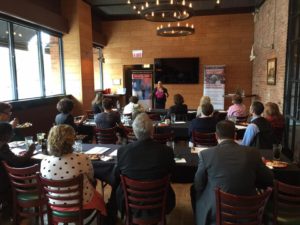 They say that people judge you by the company you keep. In this case, I sincerely hope it’s true!
They say that people judge you by the company you keep. In this case, I sincerely hope it’s true!
I was thrilled to be quoted in Carol’s recent post on entrepreneur.com, “8 Master Tips on How to Get Paid for Public Speaking.”
So many great speakers were quoted as well – Michael Port, Scott Stratten, Ramon Ray, Gene Marks, Barry Moltz, and Phil Gerbyshak. There is some excellent information in this article. Carol begins:
One of the top questions I get from entrepreneurs, experts and other professionals is “How do you go about actually getting paid for public speaking?” I turned to some of my well-respected colleagues who speak at various fee levels to get their best advice and have boiled it down to eight steps for you.
1. Speak for free.
Before you get to go pro at anything, you need to spend some time as an amateur. As Gene Marks, President of The Marks Group PC, advises, “Speak a lot for free. Reach out to your local rotary and Lion’s clubs, small chambers of commerce and networking groups. That way, you can hone your content and get lots of practice. Plus, as you get better, you can use these places as references for when you’re pitching paid gigs.”
It may seem difficult to find, but there are myriad events happening in just about every city every single day. As Scott Stratten, one of the most sought-after keynote speakers and President of UnMarketing Inc. puts it, “There is a huge difference between speaking and paid speaking. An infinite number of slots exist for free talks, not so much for paid talks.”
2. Hone your craft.
Speaking for free gets you warmed up, but if you are going to make the leap to getting paid, you need to take it seriously. Michael Port, the Wall Street Journal bestselling author of Steal the Show and Co-Founder of HeroicPublicSpeaking.com, says, “Professional speaking is a craft like acting, directing, producing or writing. The only difference is that, as a professional speaker, you must master all of those disciplines.
“You are the writer, the director, the actor and the producer. You are creating and performing a one-person show. Just having expertise in a subject isn’t enough anymore. Audiences and meeting planners expect an extraordinary experience.
“No, they don’t expect you to sing or dance, but they do expect to be entertained while you educate and inspire them. Fortunately, we see more professional speakers taking the craft seriously. Studying, training, and rehearsing all in the pursuit of mastery.”
You can read the rest of the post here.

